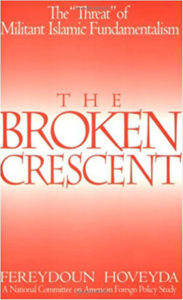
The Broken Crescent: The “Threat” of Militant Islamic Fundamentalism
Fereydoun Hoveyda
Praeger Publishers (1998)
Rs4,231
Militant Islamic fundamentalists blame the ills of their societies on the West and call for the overthrow of local governments and the resumption of Jihad against the “Infidels”. Ambassador Hoveyda explores the historical and contemporary causes of the current wave of militant Islamic fundamentalism. Despite their terrorist attacks in the West, he also shows why fundamentalists are even more dangerous for Muslim countries that are desperately trying to catch up with the incipient global economy and alleviate their accumulated social and economic problems.
If Western colonization and economic domination of the 19th and 20th centuries are to be blamed for the predicament of Muslim countries, Hoveyda points out that Muslims also bear a great responsibility for their situation. He shows how the triumph of fundamentalist interpretations of the Holy Quran in the 12th century triggered the gradual decline of Islamic civilization. He also chronicles the history of militant Islamic movements of the past and present from the “Assassins” of the late 11th century to Ayatollah Khomeini. Having met his first militant Islamic fundamentalist at the age of four in Syria, where his father was serving as Persian Consul-general, Hoveyda draws upon a lifetime of personal experience as well as scholarship and experiences of others to provide an important insider/outsider examination of a worldwide concern.
Fereydoun Hoveyda is Senior Fellow with the National Committee on American Foreign Policy. He also is a former Iranian Ambassador to the UN (1971-1978). A widely published author of fiction and nonfiction, his Les neiges du Sinai won the Leopold Senghor Award in 1973.
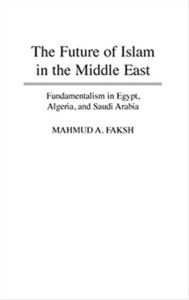
The Future of Islam in the Middle East: Fundamentalism in Egypt, Algeria, and Saudi Arabia
Mahmud Faksh
Praeger (1997)
Rs13,711
An important new study that assesses comparatively the future of Islamic fundamentalism in three key countries: Egypt, Algeria, and Saudi Arabia. Islamism has witnessed an upsurge and new-found zealotry and stridency in the post-Gulf War period, but its real fortunes have fallen far short of expectations, according to Mahmud Faksh. Indeed, as outlined in this work, it is now being stymied on many fronts. The book focuses on the limits of Islamic fundamentalism as a system of thought, as well as a force for changing the established order. And it shows that the threat of an Islamic avalanche?despite assorted high-profile, militant activities?is overstated, unrealistic, and lacking in credibility.
“A scholarly and very readable book for all seeking to better understand the conflicts, challenges, and attraction of present-day Islamism-Islamic fundamentalism. Highly recommended,”said Choicemagazine.
“Provides a good example of why theoretical engagement is necessary for accurate inquiry is area studies research,”says the International Journal of Middle East Studies.
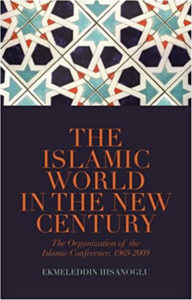
Islamic World in the New Century: The Organisation of the Islamic Conference, 1969-2009
Ekmeleddin Ihsanoglu
Hurst (2010)
Rs7,208
These are challenging times for the world’s fifty-seven Muslim countries and their relationship with the West. The Organization of the Islamic Conference (OIC) is the Muslim world’s intergovernmental body - the largest such organisation outside of the United Nations system and is based in Jeddah, Saudi Arabia.
In 2005, OIC countries elected Ekmeleddin Ihsanoglu of Turkey with a mandate to transform the forty-year-old organisation. Created to respond to the Palestinian crisis, it has since branched out into economic development, education, culture, science, technology, conflict resolution and Islamophobia. This book tells the OIC story, how and why it was formed; its achievements, successes and failures, and why modernisation is needed.
“Despite its significance in the Muslim world and in the field of NGOs, there is practically no serious and reliable book on the Organisation of the Islamic Conference, its mission, history and activities,” says Ibrahim Kalin from the Center for Muslim- Christian Understanding, Georgetown University.
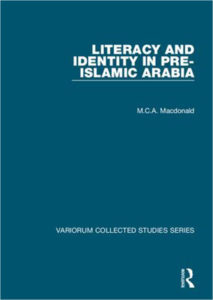
Literacy and Identity in Pre-Islamic Arabia
M.C.A. Macdonald
Routledge (2009)
Rs17,619
In these studies Michael Macdonald examines the extraordinary flowering of literacy in both the settled and nomadic populations of western Arabia in the 1500 years before the birth of Islam, when a larger proportion of the population could read and write than in any other part of the ancient Near East, and possibly any other part of the ancient world. Even among the nomads there seems to have been almost universal literacy in some regions. The scores of thousands of inscriptions and graffiti they left paint a vivid picture of the way-of-life, social systems, and personal emotions of their authors, information which is not available for any other non-élite population in the ancient Near East outside Egypt. This abundance of inscriptions has enabled Michael Macdonald to explore in detail some of the - often surprising - ways in which reading and writing were used in the literate and non-literate communities of ancient Arabia. He describes the many different languages and the distinct family of alphabets used in ancient Arabia, and discusses the connections between the use of particular languages or scripts and expressions of personal and communal identity. The problem of how ancient perceptions of ethnicity in this region can be identified in the sources is another theme of these papers; more specifically, they deal from several different perspectives with the question of what ancient writers meant when they applied the term ‘Arab’ to a wide variety of peoples throughout the ancient Near East.
M.C.A. Macdonald is a Research Associate at the Oriental Institute, and a Fellow of Wolfson College, University of Oxford, UK.
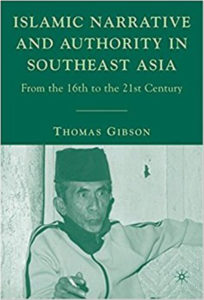
Islamic Narrative and Authority in Southeast Asia: From the 16th to the 21st Century
Thomas Gibson
Palgrave (2007),
Rs6,807
This is a literary and anthropological analysis of historical narratives that illuminate regional notions of cosmological kingship, cosmopolitan notions of Islamic law and mysticism, and global notions of the modern bureaucratic state. These notions have coexisted in Southeast Asia since the 16th Century and influence politics to this day.
“A complex and ambitious study, Tom Gibson has followed up on his previous foray into the interweaving memories and traditions of Sulawesi to explore the ways in which Islam has been interpreted, appropriated, and deployed in a particular Southeast Asian context… The result of long years of labour, this is indeed a major achievement and students of Islam and Asian history should certainly look forward to the final volume of the planned trilogy,” said Michael Laffan of Princeton University in the Journal of the Economic and Social History of the Orient.
“Against this backdrop, Thomas Gibson’s new book, Islamic Narrative and Authority in Southeast Asiastands as a major contribution to our understanding of Islam in Southeast Asia… Gibson’s erudite readings and expert renderings of oral histories, Islamic scriptures, epic narratives, aristocratic geneaologies, and state documents represent the very best kind of scholarship as practiced by an anthropologist-cum-historian,” says John T. Sidel of the London School of Economics.
“Gibson’s book is an ambitious and successful attempt to formulate structural models for the interpretation of Islamic history in Southeast Asia over five centuries. It is a major achievement that will be taken up by students of Islam and of Asian history,” says Peter van der Veer of University College, Utrecht University.
“This innovative and important work critically examines the interaction of overlapping spheres of symbolic knowledge in the historical development of a major Muslim community in Indonesia. Through meticulously tracing the permutations of indigenous Austronesian conceptions of authority, Islamic understandings of learning and charisma, and bureaucratic models of knowledge and power, Gibson demonstrates the continuing relevance of each of these dimensions in contemporary Makassarese Muslim responses to both Indonesian national ‘reformation’ (Reformasi) and Islamic religious revival in the era of globalization. Drawing expertly on sources in both Makassarese and modern Indonesian as well as Dutch colonial archives, Gibson draws detailed pictures of a series of shifts in the equilibrium between these modes of religious and political authority over the past four centuries. It is an ambitious book,” says R. Michael Feener, Associate Professor of History, Asia Research Institute, National University of Singapore.
“This is a work of impressive scope, reaching far across time and space, yet remaining carefully grounded in the ethnography of South Sulawesi. At a time when overgeneralizations about Islam abound, it is extremely useful to have a perspective from a place that, while seemingly marginal to the heartlands of the Muslim world, is also the product of a thoroughly cosmopolitan history,” says Webb Keane, Professor of Anthropology, University of Michigan.
Thomas Gibson is Professor and Chair of Anthropology at the University of Rochester, USA.

